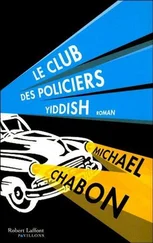Michael Chabon - The Yiddish Policemen's union
Здесь есть возможность читать онлайн «Michael Chabon - The Yiddish Policemen's union» — ознакомительный отрывок электронной книги совершенно бесплатно, а после прочтения отрывка купить полную версию. В некоторых случаях можно слушать аудио, скачать через торрент в формате fb2 и присутствует краткое содержание. Жанр: Альтернативная история, Полицейский детектив, на английском языке. Описание произведения, (предисловие) а так же отзывы посетителей доступны на портале библиотеки ЛибКат.
- Название:The Yiddish Policemen's union
- Автор:
- Жанр:
- Год:неизвестен
- ISBN:нет данных
- Рейтинг книги:5 / 5. Голосов: 1
-
Избранное:Добавить в избранное
- Отзывы:
-
Ваша оценка:
- 100
- 1
- 2
- 3
- 4
- 5
The Yiddish Policemen's union: краткое содержание, описание и аннотация
Предлагаем к чтению аннотацию, описание, краткое содержание или предисловие (зависит от того, что написал сам автор книги «The Yiddish Policemen's union»). Если вы не нашли необходимую информацию о книге — напишите в комментариях, мы постараемся отыскать её.
The Yiddish Policemen's union — читать онлайн ознакомительный отрывок
Ниже представлен текст книги, разбитый по страницам. Система сохранения места последней прочитанной страницы, позволяет с удобством читать онлайн бесплатно книгу «The Yiddish Policemen's union», без необходимости каждый раз заново искать на чём Вы остановились. Поставьте закладку, и сможете в любой момент перейти на страницу, на которой закончили чтение.
Интервал:
Закладка:
“I didn’t know you play.”
“I’m weak,” Landsman says. By the closet, on plush carpet the medicated yellow-green of a throat lozenge, he spots a tiny white feather. Landsman jerks open the closet door, and there on the floor is the pillow, shot through the heart to silence the concussion of bursting gases in a shell. “I have no feel for the middle game.”
“In my experience, Detective,” Tenenboym says, “it’s all middle game.”
“Don’t I know it,” Landsman says.
He calls to wake his partner, Berko Shemets.
“Detective Shemets,” Landsman says into his mobile phone, a department-issue Shoyfer AT. “This is your partner.”
“I begged you not to do this anymore, Meyer,” Berko says. Needless to say, he also has eight hours to go until his next shift.
“You have a right to be angry,” Landsman says. “Only I thought maybe you might still be awake.”
“I was awake.”
Unlike Landsman, Berko Shemets has not made a mess of his marriage or his personal life. Every night he sleeps in the arms of his excellent wife, whose love for him is merited, requited, and appreciated by her husband, a steadfast man who never gives her any cause for sorrow or alarm.
“A curse on your head, Meyer,” Berko says, and then, in American, “God damn it.”
“I have an apparent homicide here at my hotel,” Landsman says. “A resident. A single shot to the back of the head. Silenced with a pillow. Very tidy.”
“A hit.”
“That’s the only reason I’m bothering you. The unusual nature of the killing.”
Sitka, with a population in the long jagged strip of the metro area of three point two million, averages about seventy-five homicides a year. Some of these are gang-related: Russian shtarkers whacking one another freestyle. The rest of Sitka’s homicides are so-called crimes of passion, which is a shorthand way of expressing the mathematical product of alcohol and firearms. Cold-blooded executions are as rare as they are tough to clear from the big whiteboard in the squad room, where the tally of open cases is kept.
“You’re off duty, Meyer. Call it in. Give it to Tabatchnik and Karpas.”
Tabatchnik and Karpas, the other two detectives who make up B Squad in the Homicide Section of the District Police, Sitka Headquarters, are holding down the night shift this month. Landsman has to acknowledge a certain appeal in the idea of letting this pigeon shit on their fedoras.
“Well, I would,” Landsman says. “Except for this is my place of residence.”
“You knew him?” Berko says, his tone softening.
“No,” Landsman says. “I did not know the yid.”
He looks away from the pale freckled expanse of the dead man stretched out on the pull-down bed. Sometimes he can’t help feeling sorry for them, but it’s better not to get into the habit.
“Look,” Landsman says, “you go back to bed. We can talk about it tomorrow. I’m sorry I bothered you. Good night. Tell Ester-Malke I’m sorry.”
“You sound a little off, Meyer,” Berko says. “You okay?”
In recent months Landsman has placed a number of calls to his partner at questionable hours of the night, ranting and rambling in an alcoholic dialect of grief. Landsman bailed out on his marriage two years ago, and last April his younger sister crashed her Piper Super Cub into the side of Mount Dunkelblum, up in the bush. But Landsman is not thinking of Naomi’s death now, nor of the shame of his divorce. He has been sandbagged by a vision of sitting in the grimy lounge of the Hotel Zamenhof, on a couch that was once white, playing chess with Emanuel Lasker, or whatever his real name was. Shedding the last of their fading glow on each other and listening to the sweet chiming of broken glass inside. That Landsman loathes the game of chess does not make the picture any less touching.
“The guy played chess, Berko. I never knew. That’s all.”
“Please,” Berko says, “please, Meyer, I beg you, don’t start with the crying.”
“I’m fine,” Landsman says. “Good night.”
Landsman calls the dispatcher to make himself the primary detective on the Lasker case. Another piece-of-shit homicide is not going to put any special hurt on his clearance rate as primary. Not that it really matters. On the first of January, sovereignty over the whole Federal District of Sitka, a crooked parenthesis of rocky shoreline running along the western edges of Baranof and Chichagof islands, will revert to the state of Alaska. The District Police, to which Landsman has devoted his hide, head, and soul for twenty years, will be dissolved. It is far from clear that Landsman or Berko Shemets or anybody else will be keeping his job. Nothing is clear about the upcoming Reversion, and that is why these are strange times to be a Jew.
2
While he waits for the beat latke to show, Landsman knocks on doors. Most of the occupants of the Zamenhof are out for the night, in body or mind, and for all that he gets out of the rest of them, he might as well be knocking on doors at the Hirshkovits School for the Deaf. They are a twitchy, half-addled, rank, and cranky bunch of yids, the residents of the Hotel Zamenhof, but none of them seems any more disturbed than usual tonight. And none of them strikes Landsman as the type to jam a large-caliber handgun against the base of a man’s skull and kill him in stone-cold blood.
“I’m wasting my time with these buffaloes,” Landsman tells Tenenboym. “And you, you’re sure you didn’t see anybody or anything out of the ordinary?”
“I’m sorry, Detective.”
“You’re a buffalo, too, Tenenboym.”
“I don’t dispute the charge.”
“The service door?”
“Dealers were using it,” Tenenboym says. “We had to put in an alarm. I would have heard.”
Landsman gets Tenenboym to telephone the day manager and the weekend man, snug at home in their beds. These gentlemen agree with Tenenboym that, as far as they know, no one has called for the dead man or asked after him. Ever. Not during the entire course of his stay at the Zamenhof. No visitors, no friends, not even the delivery boy from Pearl of Manila. So, Landsman thinks, there’s a difference between him and Lasker: Landsman has occasional visits from Romel, bearing a brown paper bag of lumpia.
“I’m going to go check out the roof,” Landsman says. “Don’t let anybody leave, and call me when the latke decides to show up.”
Landsman rides the elevatoro to the eighth floor and then bangs his way up a flight of steel-edged concrete steps to the roof of the Zamenhof. He walks the perimeter, looking across Max Nordau Street to the roof of the Blackpool. He peers over the north, east, and south cornices to the surrounding low structures six or seven stories down. Night is an orange smear over Sitka, a compound of fog and the light of sodium-vapor streetlamps. It has the translucence of onions cooked in chicken fat. The lamps of the Jews stretch from the slope of Mount Edgecumbe in the west, over the seventy-two infilled islands of the Sound, across the Shvartser-Yam, Halibut Point, South Sitka, and the Nachtasyl, across Harkavy and the Untershtot, before they are snuffed in the east by the Baranof range. On Oysshtelung Island, the beacon at the tip of the Safety Pin-sole remnant of the World’s Fair-blinks out its warning to airplanes or yids. Landsman can smell fish offal from the canneries, grease from the fry pits at Pearl of Manila, the spew of taxis, an intoxicating bouquet of fresh hat from Grinspoon’s Felting two blocks away.
“It’s nice up there,” Landsman says when he gets back down to the lobby, with its ashtray charm, the yellowing sofas, the scarred chairs and tables at which you sometimes see a couple of hotel residents killing an hour with a game of pinochle. “I should go up more often.”
Читать дальшеИнтервал:
Закладка:
Похожие книги на «The Yiddish Policemen's union»
Представляем Вашему вниманию похожие книги на «The Yiddish Policemen's union» списком для выбора. Мы отобрали схожую по названию и смыслу литературу в надежде предоставить читателям больше вариантов отыскать новые, интересные, ещё непрочитанные произведения.
Обсуждение, отзывы о книге «The Yiddish Policemen's union» и просто собственные мнения читателей. Оставьте ваши комментарии, напишите, что Вы думаете о произведении, его смысле или главных героях. Укажите что конкретно понравилось, а что нет, и почему Вы так считаете.












